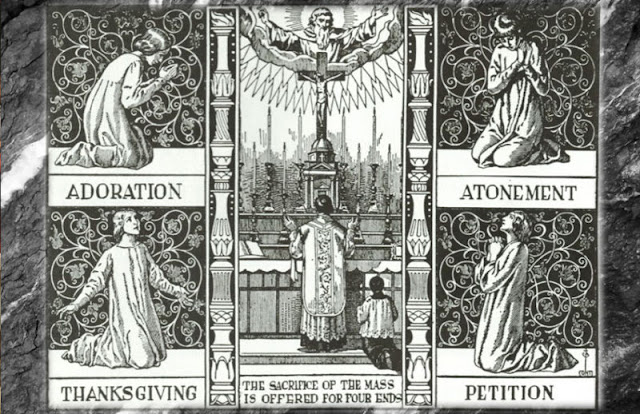Thus,I do agree with Cardinal Cupich that we have to begin with the Mass first in terms of a Eucharistic Revival. Why is there a loss in belief of not only “Transubstantiation” but also the sacrificial aspect of the Mass? I’m not sure the good Cardinal or many others are asking this main question, thus any answers they have will do nothing to change the status quo of the Modern Roman Missal’s banal celebrations.
Here, in my most humble opinion, are the problems that need to be addressed but the USCCB and Cardinal Cupich refuse to address as it concerns why things are so abysmal with what the implementation of the “New Mass” has wrought:
—It is because of institutional and canonical reasons: The Post Vatican II Mass dumbs down the Mass and its solemnity and it is banal in more places in which the Mass isn’t. Why isn’t that being addressed first?
—The Mass, due to the way the altar is situated and the priest is situated is made out to be just a convivial meal made up of friends. It is a closed circle and fellowship, superficial or real, is the goal.
—I suspect of the 20% or more of Catholics who actually bother to attend the Modern Mass, that maybe 1% of those actually understand the Sacrificial aspect of the Eucharistic Prayer beginning with the Offertory. They don’t understand that the Consecrations take place following the Epiclesis, that is, the calling down of the Holy Spirit to change the bread and wine into the Sacramental real presence of Jesus Christ, crucified and risen. They don’t understand that after the proclamation of the Mystery of Faith, the anemesis is the ordained priest offering to God the Father, the High Priest, Jesus Christ, in atonement for our sins, in a bloodless, glorious sacrificial way. They don’t understand that apart from Jesus being present on the altar and available for our adoration at the main elevations, that this is the most important aspect of the Mass—renewing in an unbloody and eternal way the one Bloody Sacrifice of Christ, which alone opens the gates of heaven to repentant and reconciled sinners.
—When it comes to the Sacrificial Banquet during the Rite of Holy Communion, few understand the link between the Sacrifice that has been celebrated and that we must receive the Crucified and Risen Lord worthily into our souls cleansed by both Holy Baptism and Sacrament Confession for post-Baptismal sins. The state of the sinner’s soul must be pristine, free of the corruption of sin, as it is when we are baptized, to worthily receive Holy Communion.
—Recovery of kneeling for Holy Communion in the Roman Rite will go a long way in reinforcing the sacrificial aspect of the Eucharistic Prayer and its link to the Sacrificial Banquet of receiving the Complete and whole crucified and Risen Christ under either form of the Sacred Species.
—The dismissal of the Mass reminds us to bring Christ home and to the world through the orthodox good works linked to our orthodox Catholic Faith—orthodoxy/orthopraxisis.
—The Crucified and Risen Lord remains in the Sacred Species reserved in the tabernacle for Holy Communion to the sick and dying but also for adoration and contemplation, the highest form in Solemn Exposition of the Most Blessed Sacrament in a monstrance either in a church building or on the move in a Procession. This is the afterglow of the Mass itself.
Apart from Eucharistic Adoration, is the USCCB addressing all of the other points I highlight, especially the dignity with which the Mass is celebrated with attention to detail and the reverent reception of the Most Blessed Sacrament, externally and internally, especially by a recovery of kneeling to receive?


2 comments:
Evelyn Waugh wrote the following letter to the editor of the Catholic Herald, 7 August 1964:
“Sir, - …..a word about liturgy. It is natural to the Germans to make a row. The torchlit, vociferous assemblies of the Hitler Youth expressed a national passion. It is well that this should be canalised into the life of the Church. But it is essentially un-English.
We seek no ‘Seig Heils’ . We pray in silence. ‘Participation’ in the Mass does not mean hearing our own voices. It means God hearing our voices. Only He knows who is ‘participating’ at Mass. I believe, to compare small things with great, that I ‘participate’ in a work of art when I study it and love it silently. No need to shout.
Anyone who has taken part in a play knows that he can rant on the stage with his mind elsewhere. If the Germans want to be noisy, let them. But why should they disturb our devotions?
‘Diversity’ is deemed by the Progressives as one of their aims against the stifling Romanita. May they allow it to English Catholics.
I am now old but I was young when I was received into the Church. I was not at all attracted by the splendour of her great ceremonies - which the Protestants could well counterfeit. Of the extraneous attractions of the Church which most drew me was the spectacle of the priest and his server at low Mass, stumping up to the altar without a glance to discover how many or how few he had in his congregation; a craftsman and his apprentice; a man with a job which he alone was qualified to do.
That is the Mass I have grown to know and love. By all means let the rowdy have their ‘dialogues’, but let us who value silence not be completely forgotten.
Your obedient servant,
Evelyn Waugh. “
Cupich is a leftist without a touch of humanity
Post a Comment